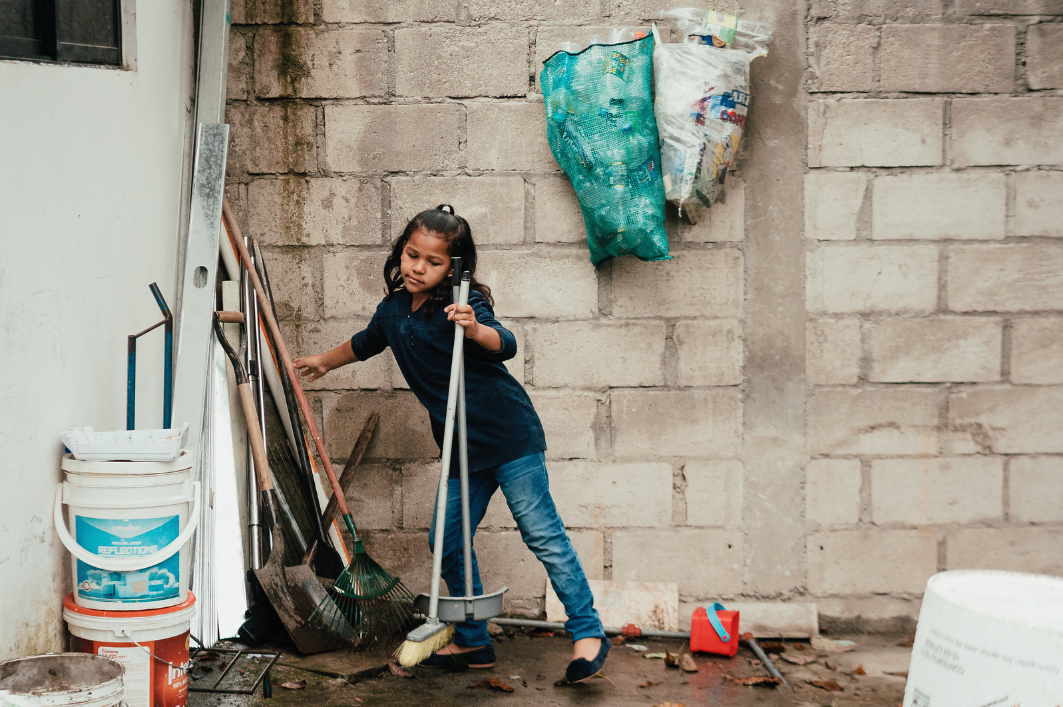Looking for conversation, a cab driver who took me on a trip to a distant city told me about his family: “I have a girl and a boy. I had to take her out of school because I couldn’t afford to pay for uniforms, books, snacks, transportation…” I asked him: “Why did you take her out of school and not the boy? Didn’t she get good grades?” He answered: “If you knew that she is much more diligent than him, but she is already 13, her breasts stated to develop, soon she will become pregnant and I will lose all the money. Besides, the boy is the one who needs to work to support his future family.
This father expects his daughter to be an adolescent mother because he sees her that way, a “a girl with breasts” as he says. It is his culture, part of the custom: girls grow up and get pregnant, the boy is the protector and provider of the home. This gender stereotype is perpetuated from generation to generation, limiting the socio-productive progress of adolescent girls and their equal access to opportunities and rights.
But a girl outside the school circuit who becomes pregnant faces an extraordinary risk to her own health and to the rest of her living conditions, especially her educational future. According to a study carried out by CAF, teenage pregnancy and motherhood are exogenous factors of school disengagement, and another PAHO study indicates that teenage pregnancy is proportionally higher the lower the educational level of the girls involved.
This is a pressing problem for adolescent girls to be able to study, work and mature sufficiently before motherhood. But also for their families and the whole community because it compromises the family economy and social mobility: if they are poor, this maternity increases the possibility of continuing or worsening their poverty and, thus, that their children will also grow up in poverty.
The Venezuelan case: an alarming situation
Venezuela doubles the average teenage motherhood rate in Latin America. According to the Venezuelan Association for Alternative Sexual Education (AVESA), Venezuela has the highest teenage pregnancy rate in South America with 84.6 cases per 1,000 women aged 15 to 19
The context of most of these births is that of urban slums with high levels of poverty, lack of access to sanitary services and menstrual hygiene, failures in the supply of drinking water, coupled with a serious deterioration of family income after years of hyperinflation. In addition, family disintegration — the result of the migratory exodus that placed thousands of children and adolescents in the care of indirect relatives and close people — among many other problems.
School dropout and school abandonment deserve a separate mention. Beyond the COVID-19, the return to the classroom has been only partial in Venezuela, because the situation of the schools and their equipment, the food deficit, the fuel problems — with their implications on public transportation — and the salaries of the teaching staff (US$30 per month in the best of cases) keep thousands of children and adolescents out of the classrooms.
Indeed, the 2023 National Survey of Living Conditions (ENCOVI) reports that 40% of school students between the ages of 3 and 17 do not attend classes regularly. Students still do not acquire the knowledge required to pass a grade or level, and the situation has become increasingly critical since the implementation of the mosaic schedule, which is now used in 80% of the country’s schools. In this system, teachers teach between one and three days a week, as the rest are dedicated to other jobs that allow them to earn additional money.
In this context, overcoming a problem such as teenage pregnancy means working on the construction of alternatives to avoid dropping out of school, which means reactivating as soon as possible the availability of free contraceptives available to young people, along with comprehensive sex education. In Venezuela, only 26.6% of women use contraceptives due to shortages, low income or lack of sex education.
It is difficult to reverse this problem because on many occasions, pregnancy could hide a previous sexual aggression, there is a double victimization of the adolescent, also of the mother, who is made responsible for prevention, when she could be a head of household without having the conditions to guarantee that protection.
It would be worthwhile to try to learn from other experiences. For example, the outpatient clinics with friendly services in Colombia, an initiative to change the protocols of care and turn them toward the generation of trust toward adolescents and their families, or also the massive provision of contraceptives in poor neighborhoods in the U.S. The role of the state is crucial in this matter, but also the involvement of companies, the church, families and civil society.
I imagine that many families in Venezuela must be making decisions similar to those of my cab driver. I hope that talents and efforts such as that of the teenager in this family are not lost due to sexist biases and stereotypes, and that as a society, we do not settle for roles assigned by gender in the midst of such precarious social conditions.
To this end, it is urgent to overcome the multiple sexist and patriarchal barriers that consider sexual access as a private matter of families. It is necessary to protect more girls and adolescents, insist on their schooling, protect their safety inside and outside the home and support their sexual and reproductive rights with more supplies, better outpatient provision, better public communication, less stigmatization and greater fight against violence.
*Translated by Janaína Ruviaro da Silva from the original in Spanish.













